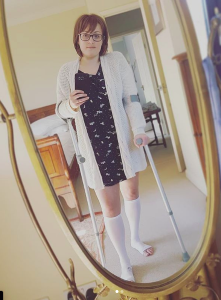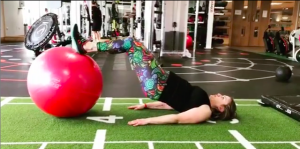
Back in March 2019 I had a total hip replacement at the age of 30. Whilst it’s not unheard of for someone young to have a surgery of this type, I still felt like there weren’t many people out there who I could quiz about their experiences, and not many blogs that helped me understand how to prepare and what to expect.
I should say that I am incredibly privileged to have private health insurance that covered a stay where I had my own room and I was extremely well attended to. I’m sure the experience would have been really different on a ward in an NHS hospital, but I hope the tips below will work for you wherever you’re going under the knife.
So here’s the first of two blogs that cover how to prepare and pack for surgery, and how to survive your time in hospital and at home after.
There is no substitution for preparation
The second most common comment I’ve had since surgery (after “oo, you’re young for that”) is “you’re recovering so well!”. I heard that from physiotherapists, my surgeon, GPs, family and friends, and to be honest I felt the same.
It all came down to preparation. More than anything, having taken part in a prehab regime made my recovery quicker and easier. I was up and about quicker, I think my pain was less than it could have been, my wrists, shoulders and elbows held up to being on crutches, and I spent a lot less time with physio post-surgery. Read my blog about prehab here.
Organise help for the first six weeks

I’m very lucky that my husband’s employer said he could work from home, and my mum is retired so between them I had 24 hour care. We’d expected me to be incapacitated for a full 6 weeks (maybe more) but actually I started doing lots of things for myself quite quickly, it was mostly washing safely, redressing and driving that I needed help with for an extended amount of time.
Packing for hospital
There are several things that I did pack that I was glad of, and some that with hindsight I would have taken. So here’s a by no means extensive list:
- E-reader and/or audiobooks – hospitals are largely boring but reading a book post-surgery can be hard so e-books are a good bet.
- Downloaded films + programmes – see above.
- Nightdresses or large t-shirts – with an eight inch hole in the side of your leg, everything becomes a faff. Wearing nightdresses or large t-shirts were a good way to balance wearing something comfortable and modest that’s not a hospital gown, with practicality when it comes to using the toilet etc.
- Creams, balms, lip salve, wet wipes etc. – it’s universally acknowledged that hospitals are hot and smell clinical. Having face and baby wipes, and familiar smelling creams, balms and salves helped me to relax, and alleviated the dry skin caused by over-heated rooms. When I felt hot and sweaty on my horrible hospital mattress, a cool face wipe made me feel human again.
- Anything that helps you feel comfortable – don’t be afraid to take anything that will make you feel comfortable. That could be a pillow, cuddly teddy, favourite blanket – anything that will help you relax and rest. The usual stay in hospital is about 5 days so do what you need to to make the space your own for that time. I bought a pillow that supports you when sleeping on your back – something you have to do for the first six weeks.
- Underwear – I recommend buying a size up, and side-opening underwear where possible. With a posterior surgery, the incision for your surgery comes up into the side of your glute, which can make you swell across quite a widespread area. The incision also passes straight under your knickers if you wear tighter fitting underwear. So going a size up is a good way to prevent your underwear cutting in when you swell up. Also, side opening underwear would have made my life so much easier – and it does exist! Getting knickers over my foot still poses a challenge, and I wish I’d known they existed prior to surgery. Give it a Google to find some that would work for you. Also, unwired bras/bralettes are great. I wanted something on for comfort (I’m well endowed shall we say, so often wearing something supportive is better than flying free!) but being in bed all day I didn’t want wires sticking in. So I got a couple of unwired bras and they were ace.
- Comfy clothes to go home in – like underwear, it may be worth buying some loose or stretchy trousers in a size up to go home in. You want something easy to get into, that won’t put pressure on the incision site or across the swollen area once they’re on.
- Slippers – if you don’t want to wear the horrible hospital anti-slip socks (who even designed those?!), take sturdy, grippy slippers with you. I bought these slip on ones for ease, lined with faux fur for comfort.
- All your medication in the original packaging – don’t take your meds in a weekly box. Hospitals need everything in original packaging so that they can prescribe it to be administered during your stay. The hospital will use the meds you take in so make sure you have enough (don’t worry if you don’t, they can prescribe more).


